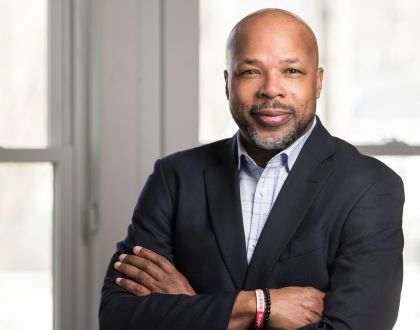
September 26, 2024
15 Minutes with Demetriouse Russell, LeadBoston ‘94
We recently sat down with Demetriouse Russell (LB ‘94, CEO of Venn Diagram Partners, LLC, a leadership development firm that builds the inclusive leadership skills that are highlighted in LeadBoston. As someone active in the field of DEI, Demetriouse has important insights on how DEI work has changed in recent years and advice for all of us on how to persist in the work at a time when DEI is under attack.
Can you tell us about your experience in LeadBoston and how it has impacted your career path?
My experience with LeadBoston was transformative, both personally and professionally. Being immersed in a cohort of leaders from various sectors gave me a broader perspective on the challenges and opportunities in the field of equity and inclusion. The program’s focus on experiential learning, combined with its emphasis on understanding the historical and systemic roots of inequity in Boston, pushed me to think more critically about my role as a leader. LeadBoston helped solidify my commitment to advancing DEI in every aspect of my work, from consulting to board service. The connections I made with other leaders have been invaluable, offering a support network and collaborative opportunities that have shaped my career trajectory.
Since participating in LeadBoston, I’ve had the privilege of achieving several milestones that stand out. First, I successfully expanded my consulting business, allowing me to partner with organizations across various industries to develop and implement impactful DEI strategies. Another significant milestone was being appointed to the board of a prominent nonprofit (Boston Harbor Now), where I’ve been able to advocate for inclusive practices at the governance level. Additionally, I was honored to be recognized on Vairix’s Boston Startup Interviews blog as a leader in the Boston community for my contributions to advancing equity, which I see as a testament to the work LeadBoston inspired me to pursue.
“What excites me the most is the tangible impact that DEI work can have on individuals and communities. Seeing organizations transform their cultures to be more inclusive and equitable, and witnessing the empowerment of employees who feel seen and valued, is incredibly rewarding.”
How do you think about equity and inclusion through your work as a consultant and through your board service?
In my work as a consultant, equity and inclusion are not just goals but foundational principles. I approach every project with the understanding that true equity requires systemic change, not just surface-level adjustments. This means working closely with organizations to identify and dismantle barriers to inclusion, whether they are in policies, practices, or organizational culture. On the boards I serve, I advocate for equity at the highest levels, ensuring that decision-making processes are inclusive and that diverse voices are not just heard but actively engaged in shaping the direction of the organization.
What aspects of your work most excite you?
What excites me the most is the tangible impact that DEI work can have on individuals and communities. Seeing organizations transform their cultures to be more inclusive and equitable, and witnessing the empowerment of employees who feel seen and valued, is incredibly rewarding. I’m also energized by the opportunity to innovate within this space—developing new approaches and strategies that address the unique challenges different organizations face. The dynamic nature of this work, where no two projects are the same, keeps me motivated and constantly learning.
What suggestions do you have for LeadBoston alums, and others, about how they can advocate for greater equity and inclusion in Boston and beyond?
For LeadBoston alums and others, my biggest suggestion is to stay committed and persistent. Advocacy for equity and inclusion is a marathon, not a sprint. Engage in continuous learning and be willing to challenge your own assumptions and biases. Collaboration is key—partner with others in your network to amplify your impact. It’s also important to be vocal and take action, whether that’s within your organization, in public forums, or through policy advocacy. Lastly, always center the voices of those most impacted by inequities in your work; they are the true experts.
What are some positive changes you’ve seen in Boston since you participated in LeadBoston? Where do you see opportunities for improvement?
Since my time in LeadBoston, I’ve seen a growing awareness and commitment to DEI across the city. More organizations are recognizing the importance of creating inclusive environments and are taking tangible steps towards equity. There’s also been a noticeable increase in conversations around racial justice, particularly following the events of recent years, which has led to more robust community engagement and activism.
However, there’s still much work to be done. Boston has a deep history of segregation and inequity that won’t be undone overnight. Opportunities for improvement include addressing economic disparities, particularly in housing and employment, and ensuring that DEI initiatives move beyond performative actions to create sustainable, systemic change. We also need to continue to focus on building inclusive leadership pipelines, so that decision-makers at all levels reflect the diversity of our communities.
About LeadBoston
Our signature leadership program, LeadBoston, supports all individual participants as they create and implement a leadership commitment. This leadership commitment is an action plan that confronts some of the systemic inequities they’ve learned about and that are showing up in their organization. This plan, and the collective LeadBoston experience, empowers leaders to create meaningful change in their workplaces, in their communities, and in the city of Boston itself. Staff work alongside alums for a year following the program to ensure participants have what they need to see their plan through.
Applications for the LeadBoston class of 2025 are open until October 7! Click here to learn more.

